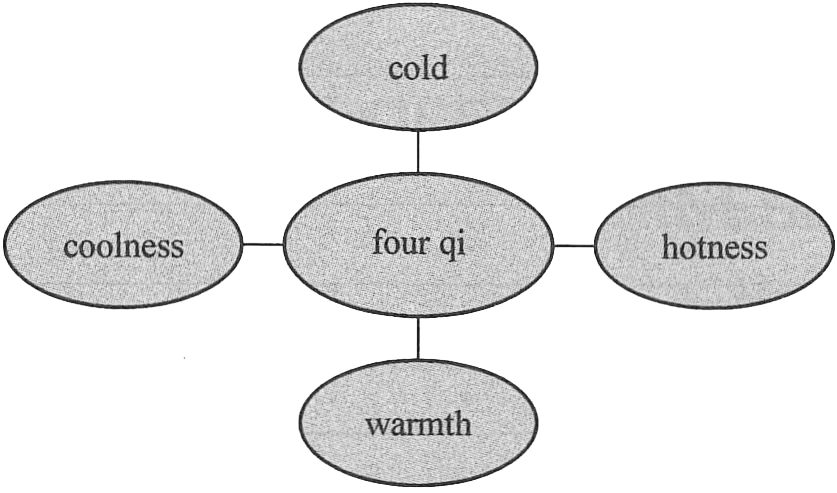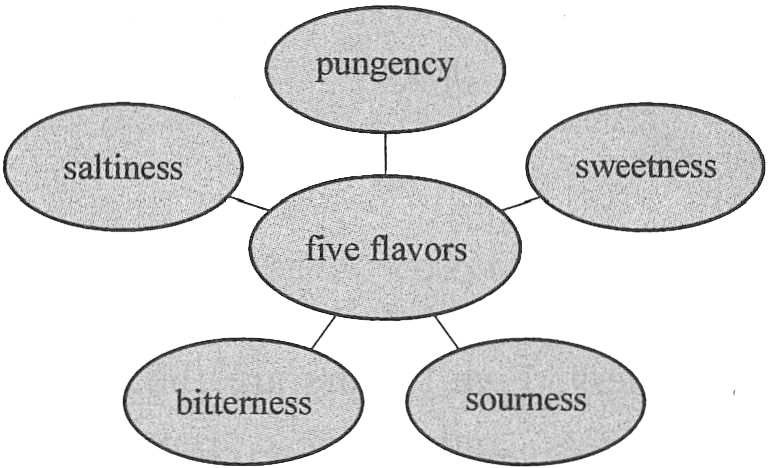
Fig. 15-1 The four qi
Text
Four qi refers to the four basic properties of medicinals: cold, hot, warmth, and coolness. Five flavors are the five tastes of medicinals: pungency, sweetness, sourness, bitterness, and saltiness, representing the basic actions of the medicinals. Direction of medicinal action refers to upward, downward, outward, and inward action of medicinals. Meridian entry means orientation of the medicinal action according to the meridian on which the therapeutic action is manifested.
Four Qi and Five Flavors
There are roughly 13,000 medicinals used in China and over 100,000 medicinal recipes recorded in the ancient literature. Plant elements and extracts are by far the most common elements used. For many plants used as medicinals, detailed instructions have been handed down not only regarding the locations and areas where they grow best, but also regarding the best timing of planting and harvesting them.
Mostly plants are used in TCM, but some animal parts, worms and insects are also widely used. Examples are rhino* horn, bear parts and tiger parts, seahorse*, sea cucumber*, tortoiseshell, leech*, gadfly*, and earthworm. Chinese medicinals also includes some human parts, such as bones, finger nail, hair, and organs.

Fig. 15-1 The four qi
Four qi refers to cold, hotness, warmth, and coolness (Fig. 15-1). Hot and warm medicinals are used to treat cold diseases, while cool and cold medicinals are used to treat heat diseases. Cold-cool and warm-hot are two completely different categories of natures. Cold and cool are yin, and warm and hot are yang. Cold and cool are in the same nature but at different degrees. Chinese medicinals with cold or cool nature can clear heat, purge* fire and eliminate toxic materials, and therefore are mainly used for treating heat syndromes. Warm or hot natured medicinals have the actions of expelling cold and restoring yang; therefore, they are mainly selected for treating cold syndromes. Additionally some Chinese medicinals are neutral, neither cold nor hot, and their actions are mild.

Fig. 15-2 The five flavors
The five flavors are the five tastes of medicinals: pungency, sweetness, sourness, bitterness, and saltiness as listed in Fig. 15-2. Some medicinals may have more than one flavor, or none (i. e. a bland flavor). A flavor implies certain properties and therapeutic actions of a substance. Saltiness drains downward and softens hard masses; sweetness is supplementing, harmonizing, pain relieving and moistening; pungent substances induce sweat and act on qi and blood, which have the action of dispersing wind and cold and promoting circulation of qi and blood; sourness tends to be astringent in nature and sour medicinals are usually applied to treating diseases like incessant perspiration, diarrhea, polymenorrhea and spermatorrhea; bitterness drains heat, purges the bowels, and eliminates dampness.
Please note that astringent flavor falls under the sour category and bland flavor falls under the sweet.
Every medicinal has its nature. Only when you have a good understanding of medicinal natures, can you correctly understand their medicinal effects. Those with the same nature possess essentially similar effects. If Chinese medicinals are similar in nature, they have similar therapeutic effects.
Directional Action
方向作用
Medicinals with upbearing property have the function of upraising (upward); medicinals with downbearing property have the action of descending (downward); medicinals with the property of floating have the effect of dispersing (outward); medicinals with the property of sinking have the function of astringing (inward) and promoting urination and defecation.*
Disease can cause qi movement disorder. Some diseases can cause qi ascending counterflow (abnormally upward flow of qi), for instance hiccup, vomiting and cough. Some diseases can cause qi movement abnormally downward, for example, diarrhea and uterine prolapse. Other diseases can cause qi movement outward, for example night sweating and spontaneous sweating. And still others can cause qi movement inward, such as absence of sweating. Many Chinese medicinals have the property opposite to the direction of pathological qi movement, hence, they can correct the pathological conditions.
Generally speaking, Chinese medicinals that are pungent and sweet, warm and heat in nature are mostly upbearing and floating in their directional effect; while those bitter, sour and salty, and cold or cool in nature are mostly sinking and downbearing in their directional action. Chinese medicinals, such as flowers, leaves and branches are mostly upbearing and floating in their directional actions, because they are light; while medicinals such as fruits, seeds and minerals are mostly sinking and downbearing, because they are heavy. There are a small number of medicinals, however, with two directional effects. Ephedra sinica*, for example, cannot only promote sweating to release the exterior but also induce diuresis to alleviate edema.
Meridian Entry (Meridian Tropism)
归经
Meridian entry refers to orientation of the medicinal action according to the meridian on which the therapeutic action is manifested, also called meridian tropism.
This property refers not only to the meridians, but also to the meridian-associated organs, which can be expected to be primarily affected by a given medicinal (there are 12 standard meridians in the body that a medicinal can act upon). For example, menthol* is pungent and cool and goes to the lung and the liver meridians. Therefore, menthol can be used to cool the lungs and purge heat toxins caused by wind-heat invasion.